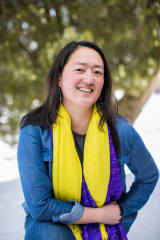Why Study Religious Studies?
“When I admire the wonders of a sunset or the beauty of the moon, my soul expands in the worship of the creator,” ruminated Mahatma Gandhi, political activist and former civil rights leader of the nonviolent resistance in India. There are many facets to religion and spirituality; histories, cultures, beliefs, and religious texts, and much more create a fascinating tapestry to study and learn more about. Religious studies is a varied and diverse field of study, which can also lead to many different career paths. If you marvel at the sunset or beauty of the moon, like Gandhi, and want to delve deeper into the mysteries of religion, then perhaps pursuing academic studies in religion the path you should be on.
- Education

“When I admire the wonders of a sunset or the beauty of the moon, my soul expands in the worship of the creator,” ruminated Mahatma Gandhi, political activist and former civil rights leader of the nonviolent resistance in India. There are many facets to religion and spirituality; histories, cultures, beliefs, and religious texts, and much more create a fascinating tapestry to study and learn more about. Religious studies is a varied and diverse field of study, which can also lead to many different career paths. If you marvel at the sunset or beauty of the moon, like Gandhi, and want to delve deeper into the mysteries of religion, then perhaps pursuing academic studies in religion the path you should be on.
What is religious studies?
Religious studies, also known as the study of religion, is a field of study that is devoted to examining the beliefs, institutions, and customs of world religions. Comparing and contrasting the different tenets of each, to more fully understand the historical context and rich nuances of an individual religion, is an example of what you’ll do as a student of religious studies. Graduates of religious studies programs go on to find fulfilling careers practicing their particular religion, or conducting research, furthering the field of study, or even consulting. Here are six top reasons why you should consider getting a master`s degree in religious studies.
1. Religious studies is an interdisciplinary field
If you have trouble narrowing your interests to just one thing, then religious studies might be the best, maybe most surprising, fit for you. Francis Gilbert, for the Local Schools Network, explains that religious studies is “multidisciplinary in nature, involving textual study, philosophical thinking, ethics, social understanding and the skills of analysis and reasoning developing core skills of literacy.” Religions -- their formation, evolution, and current practices -- are dynamic and are intricately linked to historical and cultural studies, as well as philosophy and ethics.
Any news program, reporting on the world’s conflicts, will show you how important it is to gain a broader and more in-depth understanding of the world’s religions. “Religion sets the stage for today’s world events, from war to peace movements, ethnic cleansing to human rights. It is crucial that we learn about this force that has great potential for both promoting peace and worsening conflict. Discussing and studying religion forms educated, thoughtful individuals,” emphasizes one religious studies department.
Additionally, Professor of Religion, Mark Wallace, points out, “Religious studies is rigorously and playfully open to a multicultural and international way of being that bursts the boundaries of the conventional and the everyday.” Due to its interdisciplinary nature, as a student of religious studies, you’ll be able to follow the threads of your own interests and weave your own understanding of world religions, while being guided by renowned faculty who are the prominent thinkers and experts in this field.
2. It allows for self-knowledge and understanding of others
“Know thyself,” the popular saying, originating from the Greek sages, and often attributed to Socrates, is, to this day, an important aphorism to remind oneself of. What better way to get to “know thyself” but through the study of belief systems? Religious studies provides the time and space to consider the deep questions of creation, origins, and the mysteries of the universe. If you do not know what you believe in, then how are you going to proceed with making even the smallest choices. And, how will you make bigger life choices and decisions without a strong sense of self?
Religious studies allows not only for deepening your own self-knowledge, but it also provides the foundational knowledge and opportunity to understand other people’s worldviews and religious beliefs. Kathy McLinn writing for Edutopia aptly points out that religious studies helps with “Finding correlations, connections, relationships, and causation in relation to religionis an essential component in understanding much of what has occurred in history, politically, scientifically, artistically, in literature, personal relationships and economics. When studying a culture, historical or contemporary, we can’t begin to understand a group of people without knowing their beliefs. And a group’s fundamental beliefs about matters of ultimate concern are connected to all other beliefs and behaviors within the culture.”
3. This field of study is a “social magnet”
A social magnet is a topic that people just cannot stop talking about. Imagine you’re at a cocktail party, or a work event, and everyone is milling around with a drink in hand, and what are they talking about? The topic of conversation may very well be religion, either directly or in an adjacent way. It may sound cheesy, but it’s true: “What is a hotter subject than religion? And in this time of conceptual ambiguity (what the hell is 'religion' anyway), with blurred and contested boundaries about what counts and what doesn’t, it’s even more appealing for people to talk about,” according to Gary Laderman in HuffPost. As a student of religious studies, you’ll be able to debate, knowledgeably, about the current state of religious affairs. Your informed opinion might sway someone’s mind, who has a stereotypical view or unfounded preconceived notions of a particular world religion.
4. You will likely get to travel
As a student of religious studies, you might include a year or semester abroad in your coursework in order to study a particular world religion and its practice. Most dedicated religious studies students will want to get firsthand experience and witness their religion of choice in practice. “Travel is not a compulsory aspect of religious studies,” but definitely enhances the overall degree program, recommends the Oxford Royale Academy. Seriously, where is a better place to compare and contrast the nuances of practicing Christianity, Hinduism, and Islam, than in India? Going to the source of where these religions began, walking along the Ganges River, taking in the sacred sites in Jerusalem, or stepping inside a mosque and hearing the call to prayer... any one of these could be, arguably, more life-changing than reading about it in a book, or listening to a lecture. The opportunities to travel and experience the world’s religions, in person, is one major benefit of pursuing a degree in religious studies.
5. Religion is a vital aspect of human existence
The undeniable fact is that religion -- beliefs, practices, and tenets -- are a vital part of human existence. Humanity would not function without the complexities of religion and the solace it provides to many seeking answers to life’s biggest questions and mysteries. Without a doubt, points out the Oxford Royale Academy, “Religious Studies provides us with can be absolutely vital in understanding the world around us. Religious practices of one kind or another are found in practically every society on Earth, and to understand them gives us an insight into a vital aspect of human existence.” If you are a curious type, or deep thinker, or struggling with making sense of the world, or intrigued by understanding other’s beliefs, then religious studies might be the best major for you.
6. There are multiple job opportunities for religious studies majors
Aside from delving deeper into the vital nature of human existence, religious studies also provides excellent foundational knowledge for a variety of careers both in religion and in the non-religion sectors. The Guardian points out that many job opportunities are available to religious studies majors: “As a religious studies graduate you’ll have plenty of valuable skills to offer an employer and will be equipped to enter professions such as education, law or journalism, or for more pastoral work, such as counselling, mediation and negotiation or social work. Graduates are also found in charity work, teaching, and personnel. After a little more training, theology graduates can work in pulpits of various denominations across the land or for a church in other roles, such as community ministers or youth work.” If you are passionate about this field, and get a good foundation of knowledge through a degree program, then you’ll be able to find a career that utilizes your talents and skills in religious studies.
“I love you when you bow in your mosque, kneel in your temple, pray in your church. For you and I are sons [and daughters] of one religion, and it is spirit,” said Khalil Gibran, Lebanese-American poet and philosopher. As a student of religious studies, there is no doubt you’ll open up your mind, heart, and spirit, you’ll deepen your knowledge, and be fully trained to compare, contrast, and understand the interdisciplinary nature of this fascinating field of study. Through religious studies, not only will you comprehend the complexities of the world with more nuance, you’ll also likely gain a deeper understanding of your own beliefs, which will serve you well in your future career too.

S.M. Audsley
Author
S. M. Audsley is a freelance writer and poet who lives and works in Vermont, a small but mighty state in the United States. She is an avid outdoor enthusiast and a lover of potlucks.
Find a program in these categories


